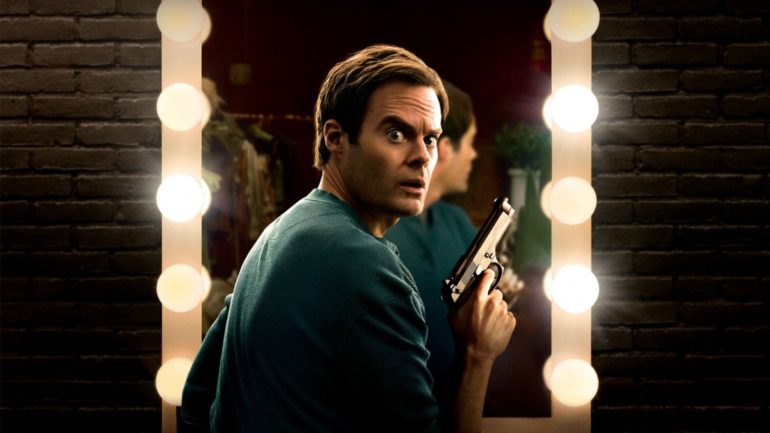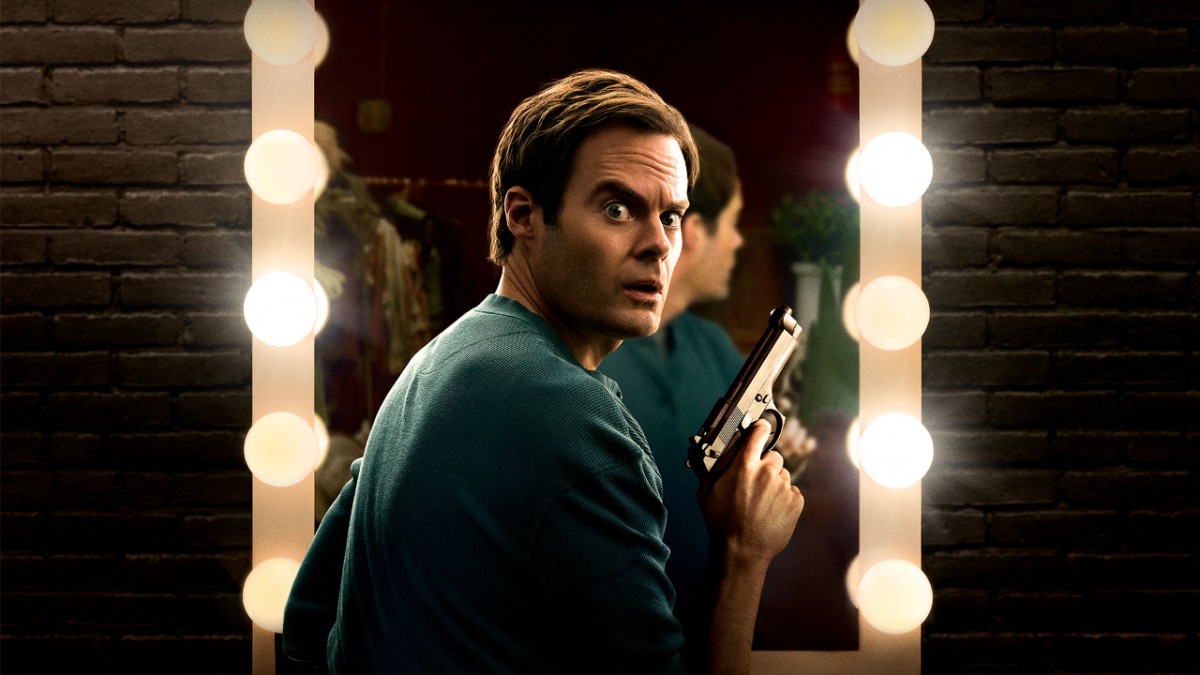Last year, season one of Barry was released on HBO. Despite being under the radar, Barry quickly embraced its crafty black comedy and breakneck violence to kindle a twisted tone and attitude, making the show wonderfully unusual. It’s initially about a dejected and reticent hit man, venturing to Los Angeles to effectuate a hit job, but shockingly finds himself beguiled by the utterly onerous and rewarding profession (and dexterity) of acting. This hitman is Barry Berkman (played by Bill Hader), a veteran enduring PTSD. He may be utterly incapable of articulating his feelings, but he sure is deft at eliminating his specified targets, managed by long-time “friend” and garrulous handler, Fuches (played by Stephen Root).

While in Los Angeles, Barry follows his target into an acting class run by the spirited and empathetic acting coach Gene Cousineau (a hilarious and honest Henry Winkler), and ends up instantly attracted to the community of aspiring actors/performers, particularly egotistical yet resolute student Sally (played by Sarah Goldberg), who ends up being Barry’s love interest. Acting is a persnickety method of translating your emotion through other roles and characters: it’s a healing mechanism that plunges you to react and express with your own vexation, melancholy, or rapture — and fulfills the dramatic, gleeful, or comedic stamina of a role convincingly.
In acting, you need vehemency and emotion, and for Barry, acting is able to emulate a podium to speak his verity, while also proving to be a form of bliss. As kooky and inane that may sound, Barry manages to unveil vigorous tension, weighty storytelling, heedful execution, and genuine chuckles by probing its troubled and enigmatic main character, Barry Berkman/Block, through alluring tonality and moral depravity.
Everything that unfolds in Barry deserves its place. The violence is certainly amplified but used cautiously, while the hilarity is influenced by the sheer absurdity of the plot but is tinkered with cleverly, similar in tone to Breaking Bad or a Coen brothers-adjacent project. Season one employed Barry Berkman as the apogee of complicated virtue, a distorted self-image corrupted by the grubby hands of war, and somebody who’s simply trying to seek bliss in a life drenched in blood and agony. Penitence and self-hatred plague Barry’s mind, and season one — although imperfect and stumbling to find its comfort in the balance of comedy, barbarity, and sadness — manifests abundant potential of what the show could become.
Thankfully, the people behind the camera know how to maintain the show’s fiery arrangement of moral reckonings and segments of violence more vividly in season two. Alongside lead Bill Hader (director of “Ronny/lily” and “berkman > block”), and frequent co-writer Alec Berg (director of “The Truth Has a Ring to It” and “The Audition”), directors Hiro Murai (“The Show Must Go On, Probably?” and “The Power of No”), Minkie Spiro (“Past = Present x Future Over Yesterday”) and Liza Johnson (“What?!”) come in for particular praise here.
In season two, Barry’s contrition, blemished self-image, and what he’s forced to do to grasp and sustain the euphoria he’s searching for in acting, results in more self-started mayhem and tragedy. The end of season one highlighted the tragic death of Detective Janice Moss (Paula Newsome), implemented by none other than Barry, who reacts impulsively and shoots Janice after she divulges the truth about Barry’s past life as a hitman. Getting away with it was the easy part, it’s dealing with Gene’s grief and despondency that’s difficult to handle. Gene and Janice were in love, and Barry eradicated the love of Gene’s life — but Barry got away with it, and is now acutely weathering the guilt of doing the unthinkable and probably unforgivable.
The season two premiere, “The Show Must Go On, Probably?”, spotlights the anguish and heartache Gene is withstanding due to Janice’s disappearance. Gene isn’t communicating with the acting class, he hasn’t shown up to a class in quite some time, and he’s spending too much time at the cabin where he last saw her, seeking to uncloak the details of how she vanished. Woefully, the FBI (or any other law-enforcing branch) is unable to uncover any attestation that provides solid reasoning for Janice’s unforeseen disappearance, rendering the case cold (for now) and triggering an emotionally scathed Gene. Barry, on the other hand, is trying strenuously hard to move past the disheartening incident, striving to motivate the team to continue with a show despite Gene’s absence, but the past keeps on exhuming more and more distress.
Janice’s death prompts Gene to self-actualize and reflect. In episode two, “The Power of No,” Gene attempts to reconnect with his son. Attaining enough motivation for the future, Gene returns to work and begins impelling Barry to revisit his past. Gene’s teaching methods prove effective, as Barry does eventually revisit his past. Gene perceives Barry’s truth as far too heinous to share to anyone, the acting troupe included, substantially because Barry’s truth can be easily miscalculated and judged harshly: during the Iraq War, Barry murdered a civilian out of rage and vexation, thinking the civilian was part of the group that killed his friend, but he wasn’t. That kind of reckless behavior is fueled by blurred vision in the time of ire, confoundment and death.
Barry is an ideal antihero, who’s very easily manipulated or maneuvered by elementary plot threads, but Bill Hader’s superb face acting and prudent writing/direction brings out an authentic depiction of PTSD, trauma and grief. “Barry” delineates Barry’s regret and lurking PTSD in a manner that’s subtle and earnest. And it’s an apt and taciturn Hader who’s able to emit a blank face and a bloated consciousness, yet that face and those unsaid feelings express more than we’ll ever know. That is, until episode four, “What?!”, which features a stunning monologue from Hader, who’s able to reveal a truth that’s despicable and forever mired in his memory, which he confides in the one person he knows he can trust: Gene.
Barry and Gene’s friendship progresses on a deeper level, but that doesn’t stop Gene from charging Barry the price of a private acting session (which keeps the comedic drive alive, even in the bleakest moments). Henry Winkler is still marvelous as the acting coach, who exhibits this empathetic attribute that makes audiences care for him and feel for him. Throughout the season, you’re torn between Barry’s actions and whether or not he’s redeemable. Even if he isn’t, though, Hader portrays the character impeccably, and it makes for a piercing and novel character study.
The lovable and frivolous Chechen gangster Noho Hank (an offbeat Anthony Carrigan) continues to be a wonderful addition, living up to the gangster conflicts and ensuring Barry doesn’t escape the hitman business until he completes one final task: Barry agrees to help Hank train his callow hit men so Hank can hinder the deal with Cristobal, a rival gangster who wants to cut a deal with the Chechens. Hank is easily a personal favorite – how can one not be swept up by Carrigan’s accent and delivery? He balances black comedy and explicit violence really effectively.
Not every character works, however. The implacable Detective John Loach (John Pirruccello) investigates Barry by using his old handler, Fuches, who also doesn’t quite function organically. The ruthless detective first appears to crave vengeance for Janice, but the conclusion of “What?!” has the detective blackmailing Barry to murder his ex-wife’s new husband. This portion of the subplot does uphold weight, especially considering how the fifth episode — a masterful upbringing of superlative comedy and showy, unexpected violence — demonstrates this subplot is meant to sketch out how those supposedly on the side of law may have intentions as tainted as anyone else’s. Nobody knows anything about anyone, and the way the show illustrates the Detective Loach twist is genuinely surprising. However, the journey to that point is rather insipid: you have Fuches wearing a wire, trying to expose Barry, and you have an unflagging detective who’s abrasively petulant. But it all comes together at the end of episode five, “Ronny/lily,” which concludes this enervating subplot on an utterly brilliant note.
Fuches, on the other hand, ends up like a lost dog, toxic and unable to survive on its own, so it keeps getting its grubby paws on whoever will nurture it back to health. In this case, Barry keeps Fuches financially successful, so when Barry abandons Fuches, he’s only behaving out of rage and frustration — much like a child throwing a tantrum after they are denied a piece of candy. Stephen Root is capable of embodying the character convincingly, but the writing badly neglects his development. Fuches needs tsome more screen time – as it is, it all comes a bit too easy for him. Season three can certainly supply that without disrupting the kooky flow of the show, especially since Hader and Root have splendid chemistry, even when they’re at each other’s throats.
For the strong-willed yet vain Sally, she continues her ventures in the unpredictable and inequitable movie business, where she finds herself trying to succeed while still maintaining her voice and image — if that’s even feasible. Sally wrangles with the agency representing her, her ex-boyfriend’s abrupt appearance in her life, and a play she’s putting on about her ex-boyfriend’s abusive streak (while also finding the courage to tell the truth when everybody will innately judge and dismiss the end product). Sarah Goldberg replicates the role of Sally in a persuasive and peppy fashion, improvising lines and radiating passive reactions to depict her character’s indelible abuse and crippling vanity.
Sally does have numerous moments in season two where her character is elevated from a perky side character. The final episode turns out to be the most monumental of these: Sally effectuates her play but alters it from a dour display of abuse to a crowd-pleasing revenge tale, where she tells off her abusive boyfriend. After the performance, she’s lauded by agents in the industry who adored this performance of abuse where the woman finally speaks up. Despite being a spurious tale of self-worth and respect, it’s an aspirational achievement, even if it wasn’t sincere. But Sally knows it was a moral defeat.
All of these characters have their own conflicts – despite only being eight episodes, the cast is able to dredge up a lot in thirty minutes. Season two never runs low on intrigue, levity, or violence. The cinematography is arresting and equanimous, compiled in static and close-up shots, outlining Hader’s inscrutable face and menacing mien. Also in regard to cinematography, in “Ronny/lily”, Hader demonstrates he knows how to realistically and artfully capture a fight sequence (the camera pans slowly and uses angles well, while also capturing the fight from a clever distance).
The last episodes expand the storytelling horizons so that season three can feel warranted and, more importantly, potentially innovative. The season finale showcases many characters collapsing: a flustered and bitter Barry implements a massacre simply to catch Fuches (a hypnotic set piece, so palpably tragic it makes you mourn for a couple of Chechen criminals). A morally deteriorating Sally, who finds that success may be measured in lies. An even more heartbroken Gene, who realizes he’s been betrayed, a fearful Fuches, who hasn’t quite perceived the fact he unleashed the Devil, and a comical Noho Hank, passively watching the Chechens die while casually coming out from a dark corner, unsure of what to do next.
I don’t know where Barry is going, but I do know Hader, Berg, and all of the upcoming directors and writers will persist on preserving the occasionally funny, barbaric, dolorous, and morally intricate tone and execution. After all, that’s what made season one and two work so devilishly well.
Some of the coverage you find on Cultured Vultures contains affiliate links, which provide us with small commissions based on purchases made from visiting our site.


